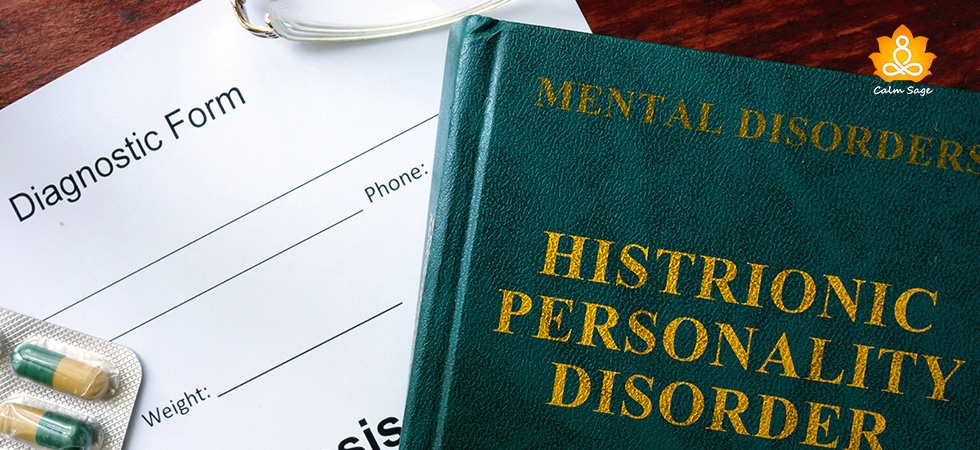Histrionic Personality Disorder | Symptoms, Causes & Treatment

Histrionic Personality Disorder is one of the many personality disorder which is classified under “Cluster B” disorders. This disorder is a mental condition where a person feels extremely emotional and seeks attention from others. The word histrionic means theatrical or dramatic.
The histrionic disorder affects roughly 2-3% of the general population. People with HPD often seek the approval of others to base their self-esteem on and may resort to theatrics to seek the attention of others.
There is not much of a difference between HPD and BPD (Borderline Personality Disorder). Borderline personality disorder has similar characteristics as HPD such as:
- Attention-seeking
- Manipulative behavior
- Rapid changes in emotions
- Impulsive behavior
Symptoms Of Histrionic Personality Disorder

People with Histrionic Personality Disorder may carry symptoms such as:
- Show signs of weakness and may use threats of self-harm to manipulate others.
- Show extreme emotions and attention-seeking behaviors.
- Experience mood swings, changes in opinions, and beliefs.
- Seek validation and attention from others by acting emotionally in public.
- Act provocatively to control others or seek attention from others.
HPD has similar symptoms to those of other personality disorders and mental disorders so the diagnosis of this disorder may be difficult. If a person has the following signs, then they might be considered having HPD:
- They are uncomfortable in situations where they are not the center of attention.
- They act inappropriately with others.
- They display signs of rapid change in emotions and expressions.
- They use physical appearance to draw attention to themselves.
- Their speech lacks details and is extremely unsystematic.
- They act quite melodramatic and use an excessive expression of emotions.
- They are suggestible and are easily swayed by others.
Causes Of Histrionic Personality Disorder

There hasn’t been an exact cause recorded of HPD but it is speculated that our genes and environmental circumstances may be a risk factor for this disorder. Some characteristics of this personality disorder can be inherited from someone in your family. Sometimes the surrounding you grew up in or some past event can also cause you to develop a histrionic personality disorder.
Other factors that can cause a person to develop HPD can be:
- Inconsistent or over-indulgent parenting style
- Parents displaying dramatic behavior
- Family history of psychiatric disorders or other personality disorders
- Trauma from a past event or situation
- Childhood trauma
There are other personality disorders that tend to occur with HPD:
- Borderline personality disorder (BPD)
- Narcissistic personality disorder
- Dependent personality disorder
Treatment For Histrionic Personality Disorder
Treatment for a histrionic personality disorder is often difficult as people with this disorder seek treatment only when it is causing then stress or affecting their relationships at work and at home.
Although this disorder can be treated with the help of:
1. Psychotherapy

Psychotherapy works with the patient to help reduce emotional stress, improve self-esteem, and teach them healthy coping skills. This therapy model can utilize self-esteem therapy to reduce negative and emotional distress and help the person to work on healthy and positive coping strategies.
Click Here to Get Help from Licensed Therapist
Disclaimer: As BetterHelp Affiliate, We may receive compensation from BetterHelp or other sources if you purchase products or services through the links provided on this page.
Group therapy is not suggested for this disorder as it may not work considering the tendencies of the person with HPD to seek approval of others and be the center of attention. Rather supportive psychotherapy is more effective for treating HPD.
Note: Consult a professional mental healthcare provider to understand the right treatment and therapy related to your symptoms.
2. Holistic Therapy

Techniques such as mindfulness meditation, yoga, and tai chi can help patients with a histrionic personality disorder. These activities can help them control their feelings, impulsive behavior, and emotional reaction to certain situations.
Practicing holistic healing can help a person with HPD to feel calm and centered in situations where their personality demands attention and validation from others.
3. Medication
There are no certain medications to treat the symptoms of HPD but some medications can help treat mood swings, anxiety, depression, and other feelings that often come with this disorder. Keep in mind that there may be some side-effects of certain medications related to your symptoms.
Note: Always consult a physician before taking any kind of medication.
Final Words
People who are diagnosed with HPD should always seek appropriate treatment. Undiagnosed and untreated HPD can cause anxiety, depression, and can worsen the existing symptoms. With the help of proper treatment or self-help tips, you can help manage your symptoms before they worsen. You can try:
- Maintain healthy eating habits
- Maintain a consistent sleep schedule
- Regular exercising
- Avoid or limit alcohol or drug use
- Ask help and support from trusted people when needed
Many people with histrionic personality disorder are able to work in casual settings but might face problems in personal and intimate relationships. This disorder can affect a person’s ability to stay in their job, maintain a healthy relationship, or their ability to stay focused on their future dreams and goals.
People with HPD are also more prone to depression and frequent feelings of frustration. If you or your loved one is suffering from this disorder, it is important you reach out and seek professional help and treatment.
Even if everyone in the world were to accept me and my illness and validate my pain unless I can abide myself and be compassionate toward my own distress, I will probably always feel alone and neglected by others.” – Kiera Van Gelder
Stay Healthy, Stay Safe!





















Self help tips are very useful! will surely recommend further